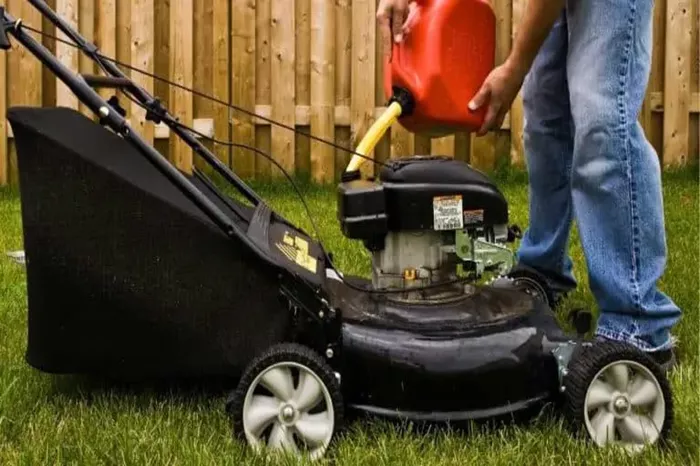Understanding the type of gasoline to use for your lawn mower is crucial for its performance and longevity. This guide will walk you through the best gasoline choices, common misconceptions, and tips for maintaining your lawn mower’s engine.
Types of Gasoline
Regular Unleaded Gasoline
Regular unleaded gasoline is the most common type of fuel used in lawn mowers. It typically has an octane rating of 87. This type of gasoline is suitable for most lawn mowers, including both two-stroke and four-stroke engines. Regular unleaded gasoline is widely available and affordable.
Mid-Grade Gasoline
Mid-grade gasoline has a higher octane rating, usually around 89. Some lawn mower manufacturers recommend using mid-grade gasoline for optimal performance. The higher octane rating can help prevent knocking and pinging in the engine. While it is more expensive than regular unleaded gasoline, it can be beneficial for certain engines.
Premium Gasoline
Premium gasoline has the highest octane rating, generally 91 or higher. It is designed for high-performance engines that require a higher compression ratio. Most lawn mowers do not need premium gasoline. However, if your lawn mower’s manufacturer specifically recommends it, using premium gasoline can enhance engine performance and efficiency.
Ethanol Content in Gasoline
Ethanol is a type of alcohol commonly added to gasoline. It helps reduce emissions and reliance on fossil fuels. However, ethanol can have adverse effects on small engines, like those in lawn mowers.
E10 Gasoline
E10 gasoline contains 10% ethanol and 90% gasoline. It is safe for most lawn mowers and is widely available. E10 is often the standard gasoline sold at gas stations. However, ethanol can attract moisture, leading to fuel system issues over time.
E15 and Higher Ethanol Blends
Gasoline blends with more than 10% ethanol, such as E15 (15% ethanol) and E85 (85% ethanol), are not recommended for lawn mowers. Higher ethanol content can cause significant damage to small engines. Always check your lawn mower’s manual to confirm the recommended ethanol content.
Two-Stroke vs. Four-Stroke Engines
Lawn mowers generally have either a two-stroke or four-stroke engine. The type of engine determines the kind of gasoline and oil mixture needed.
Two-Stroke Engines
Two-stroke engines require a gasoline-oil mixture. The oil lubricates the engine, as there is no separate oil reservoir. The correct ratio of gasoline to oil is crucial. Common ratios are 50:1 or 40:1, but you should always refer to the manufacturer’s specifications. Use high-quality two-stroke oil and mix it thoroughly with gasoline.
Four-Stroke Engines
Four-stroke engines have a separate oil reservoir for lubrication. They use regular gasoline without the need for mixing. It is important to use the recommended oil type and change it regularly to keep the engine running smoothly.
Fuel Stabilizers
Using a fuel stabilizer can extend the life of gasoline, preventing it from breaking down and forming gum and varnish in the fuel system. Fuel stabilizers are particularly useful if you store gasoline for long periods or use your lawn mower infrequently.
See also: The Best Day Of The Week To Buy Gas
Storing Gasoline
Proper storage of gasoline is essential to maintain its quality and ensure the safe operation of your lawn mower.
Storage Containers
Use approved gasoline containers to store fuel. These containers are designed to handle the chemical properties of gasoline and prevent leaks. Avoid using old or damaged containers.
Storage Location
Store gasoline in a cool, dry place away from direct sunlight and heat sources. A well-ventilated area, such as a shed or garage, is ideal. Ensure the storage area is secure and out of reach of children and pets.
Shelf Life
Gasoline can degrade over time, especially when exposed to air and moisture. It is best to use gasoline within 30 days. If you need to store it longer, add a fuel stabilizer to keep it fresh.
Common Issues and Troubleshooting
Using the wrong type of gasoline or improper storage can lead to several issues with your lawn mower. Here are some common problems and how to troubleshoot them.
Starting Problems
If your lawn mower is difficult to start, it could be due to old or stale gasoline. Drain the old gasoline and replace it with fresh fuel. Check the spark plug and air filter as well, as they can also affect starting.
Engine Knocking
Engine knocking or pinging can occur if the octane rating of the gasoline is too low. Switch to a higher octane gasoline to resolve this issue. Ensure you are using the correct fuel-to-oil ratio for two-stroke engines.
Fuel System Clogs
Ethanol in gasoline can attract moisture and cause fuel system clogs. Regularly check and clean the fuel filter, and use a fuel stabilizer to prevent ethanol-related issues. If clogs persist, you may need to clean or replace the carburetor.
Manufacturer Recommendations
Always refer to your lawn mower’s manual for specific gasoline recommendations. The manufacturer will provide the best guidance on the type of gasoline, octane rating, and ethanol content suitable for your engine. Following these recommendations can prevent issues and extend the life of your lawn mower.
Environmental Considerations
Choosing the right gasoline not only affects your lawn mower’s performance but also impacts the environment. Ethanol blends like E10 can reduce emissions, but they may not be suitable for all engines. Using clean, fresh gasoline and maintaining your lawn mower properly can minimize environmental impact.
Conclusion
Selecting the appropriate gasoline for your lawn mower is vital for its performance and longevity. Regular unleaded gasoline is suitable for most mowers, but always check the manufacturer’s recommendations. Be mindful of ethanol content and use a fuel stabilizer if storing gasoline for extended periods. Proper storage and maintenance can prevent common issues and keep your lawn mower running smoothly. By following these guidelines, you can ensure your lawn mower operates efficiently and reliably season after season.
Related topics:
What To Do With Old Gasoline In Lawn Mower

